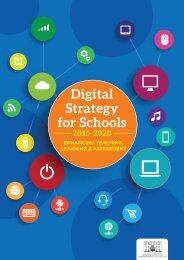Digital Strategy for Schools
TKmc0
TKmc0
Create successful ePaper yourself
Turn your PDF publications into a flip-book with our unique Google optimized e-Paper software.
DIGITAL STRATEGY FOR SCHOOLS – ENHANCING TEACHING, LEARNING & ASSESSMENT<br />
sector and has recently published a digital roadmap <strong>for</strong> institutions to assist them integrate ICT<br />
more deeply into their practice.<br />
This <strong>Strategy</strong>, like the a<strong>for</strong>ementioned Governmental policy approaches, strives to enhance the<br />
quality of our education system.<br />
PRINCIPLES UNDERPINNING THE STRATEGY<br />
In developing the <strong>Strategy</strong>, the Department engaged in an extensive research and consultation<br />
process, which is outlined in the next section. A number of key principles were identified during this<br />
phase of developing the <strong>Strategy</strong> and they will in<strong>for</strong>m the goals and actions outlined in the <strong>Strategy</strong>.<br />
TABLE 1:<br />
KEY PRINCIPLES INFORMING THE DIGITAL STRATEGY FOR SCHOOLS<br />
Principle<br />
1. A Constructivist Pedagogical Orientation<br />
underpinning the embedding of ICT in<br />
schools.<br />
2. The use of ICT in teaching, learning and<br />
assessment can enhance the learning<br />
experiences of all students.<br />
3. The use of ICT in teaching, learning and<br />
assessment is embedded in school<br />
curricula, Department policies and<br />
teacher education.<br />
4. ICT is used in an ethical and responsible<br />
way.<br />
5. ICT Planning is required to ensure ICT<br />
integration in teaching, learning and<br />
Assessment.<br />
Descriptor<br />
A constructivist pedagogical orientation supports<br />
teachers in effectively using ICT with their<br />
students i.e. learners are actively involved in a<br />
process of determining meaning and knowledge<br />
<strong>for</strong> themselves.<br />
ICT plays an important role in supporting<br />
inclusion and diversity <strong>for</strong> all learners by<br />
enhancing learning opportunities <strong>for</strong> all<br />
students.<br />
The Department and its agencies will play<br />
a proactive role in implementing the <strong>Digital</strong><br />
<strong>Strategy</strong> <strong>for</strong> <strong>Schools</strong>.<br />
<strong>Schools</strong> and the Department enable all users to<br />
use ICT in an ethical and safe way.<br />
All levels of the education system are engaged<br />
in inclusive planning <strong>for</strong> the effective integration<br />
of ICT.<br />
METHODOLOGY IN DEVELOPING THE STRATEGY<br />
An evidence-based approach was used to develop the <strong>Strategy</strong> and it was in<strong>for</strong>med by a number of<br />
phases. The ICT Policy Unit of the Department led the preparation of the <strong>Strategy</strong> and established<br />
the <strong>Digital</strong> <strong>Strategy</strong> Development Group to support its development.<br />
This group met regularly during the development of the <strong>Strategy</strong> and their work was in<strong>for</strong>med by<br />
evidence gathered from a range of sources.<br />
16




